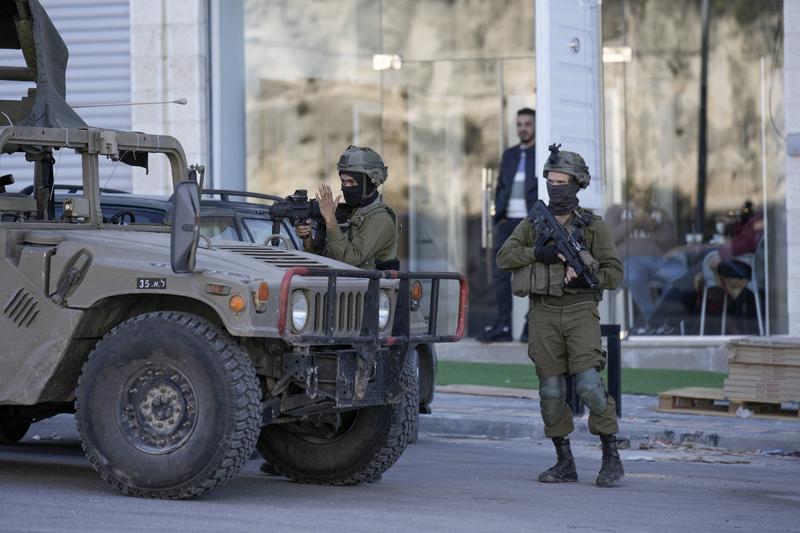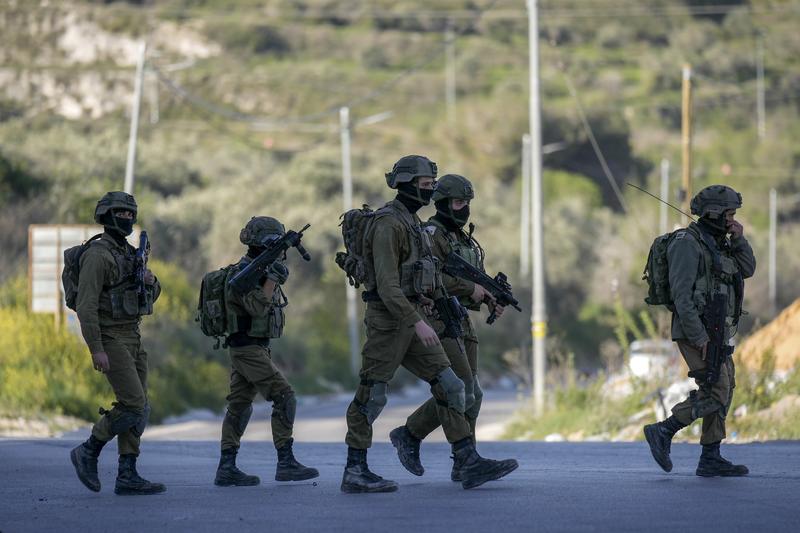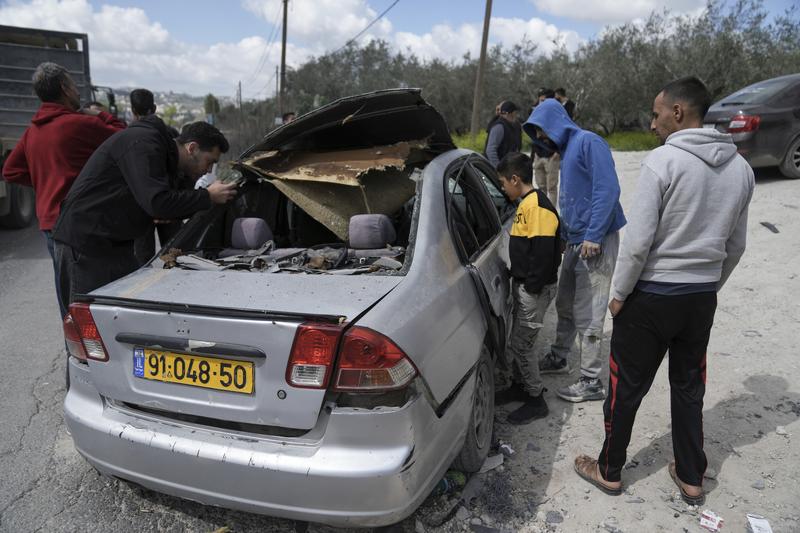 Israeli soldiers operate in village of Sarra near the Palestinians West Bank city of Nablus, March 12, 2023. (PHOTO / AP)
Israeli soldiers operate in village of Sarra near the Palestinians West Bank city of Nablus, March 12, 2023. (PHOTO / AP)
JERICHO - Before a group of young men from Aqabat Jabr refugee camp mounted a botched attack on a restaurant in Jericho popular with Israeli settlers in January, they declared allegiance to Hamas.
That was a surprise to their families - and to Hamas.
"They weren't members of Al Qassam until that moment," said Wael Awdat, father of Ibrahim and Rafat, two members of the group, using the name of the armed wing of Hamas. "They had a normal life. This was something personal."
Their story illustrates the complex mix of spontaneous action and association between established factions and new groups during an upsurge in violence in the occupied West Bank that has fuelled fears of a new Palestinian intifada to follow the uprisings of the 1980s and early 2000s.
Alienated from mainstream Palestinian leadership and raised in an era of social media, a new generation of Palestinians has formed a clutch of militant groups, from the Lion's Den based in Nablus to the Jenin Brigade.
Often with just a handful of fighters, the militant groups springing up across the West Bank over the past year have only loose ties to factions such as Hamas, Fatah or Islamic Jihad.
With tight surveillance making it impossible to operate normally in the West Bank, Hamas, which runs the blockaded Gaza Strip, is relying on more flexible, informal networks to avoid detection, two Hamas officials told Reuters, speaking on condition of anonymity for fear of Israeli reprisals.
 Israeli soldiers operate in village of Sarra near the Palestinians West Bank city of Nablus, March 12, 2023. (PHOTO / AP)
Israeli soldiers operate in village of Sarra near the Palestinians West Bank city of Nablus, March 12, 2023. (PHOTO / AP)
A Hamas cadre in Jericho, normally a tranquil city, popular as a weekend getaway spot near the Dead Sea, told Reuters the movement had not known of the cell behind the restaurant attack but said: "Any faction would be happy to claim them as members."
A few days after the attack, which failed when a gun jammed, the young men in the group were killed in an Israeli raid.
"All the signs are that the intifada is coming," said the Hamas cadre, who declined to be named for fear of Israeli reprisals. "There is a new generation of people who believe the only solution is armed struggle."
TikTok, posters and songs
Spontaneous offshoots of the established factions, such as the previously unknown Aqabat Jabr Battalion formed by the Awdat brothers and their friends, have proliferated.
"Today we have a new generation that is aware of the resistance, and this is a generation that knows the ferocity of occupation," said one masked young fighter at a rally in Jenin this month, with the colors of Al Qassam around his head.
"It does not fear arrest, injury or martyrdom. It is not afraid of anything," he told Reuters.
With no central leadership, the groups get their message out though songs, TikTok videos and posters of fighters on walls, offering a model to young men angered by what they feel as repeated humiliations by Israeli soldiers and settlers.
"The number of fighters is growing all the time and the enemy needs to know that violence against our people and our camps is increasing their number not reducing it," a masked gunman from the Jenin Brigade said.
Over the past year, Israeli forces have carried out near-daily raids in the West Bank as part of a crackdown started in the wake of a spate of deadly attacks in Israel by Palestinians.
More than 200 Palestinians, including both militants and civilians have been killed - about 80 this year alone - while over 40 Israelis and foreign nationals have been killed in attacks by Palestinians in Israel, the West Bank or around Jerusalem.
 Palestinians inspect a damaged vehicle in which three Palestinian militants were shot and killed by Israeli forces in the West Bank village of Jaba, near Jenin, March 9, 2023. (PHOTO / AP)
Palestinians inspect a damaged vehicle in which three Palestinian militants were shot and killed by Israeli forces in the West Bank village of Jaba, near Jenin, March 9, 2023. (PHOTO / AP)
As the Muslim holy month of Ramadan and the Jewish Passover approach, fears of more violence have grown, with a flood of weapons being smuggled in from Syria, Lebanon, Iraq, Lebanon, Jordan and Israel itself, Palestinian and Israeli officials say.
"It's proper weapons, it's M16s, Kalashnikovs, it's pistols, it's ammunition, it's not weapons you can make at home, it's weapons that countries buy," said a senior Israeli officer, who spoke to Reuters on condition he would not be named.
In addition, the officer said the new generation of militants were using social media effectively to mobilize.
"We have the most lethal weapon there is, that nobody talks about, which is the telephone, so on social media networks very easily things pass from hand to hand over TikTok, etc," he said.
Pleas for calm
While the lack of leadership has reduced the political focus of the new groups, Israeli officers say their fluid nature and the large number of lone attackers, with no known militant connections, has made them much harder to control.
ALSO READ: US defense secy urges Israel to tamp down West Bank tensions
Incidents such as the Feb 26 shooting of two Israelis in the West Bank by a Hamas gunman that triggered a revenge rampage by hundreds of settlers against the nearby Palestinian village of Huwara have shown the volatility of the situation.
The violence has been constant, taking place amid a daily experience for Palestinians of confrontations with soldiers at checkpoints who have stepped up the search for "lone wolf" attackers, or with Israeli settlers, some of whom taunt and attack Palestinians with apparent impunity.
As one killing succeeds another, there have been increasingly urgent pleas for calm from an alarmed international community. But neither Israel, now run by one of the most right-wing, nationalist religious governments in its history, nor the Palestinian fighters, appear ready to back down.
"What do I fear? No, I carry my weapons and stand against the army," said Ahmed Ghoneim, whose two brothers were killed in an Israeli raid in January, at a parade in the Jenin refugee camp on March 3 to honor a founder of the Jenin Brigade.
The rally was a classic display of force, with some 250 fighters from various factions parading in a courtyard, its walls plastered with pictures of their dead, posing with guns and the cropped hairstyles popular among young West Bank men.
ALSO READ: Israeli forces kill six in raid on West Bank refugee camp
Four days later, Israeli security forces raided the camp, killing at least six gunmen, including the Hamas member behind the Feb 26 Huwara shooting. Two days after that, three Islamic Jihad gunmen were killed in a raid nearby and on Sunday, three Lion's Den militants died in a shootout with Israeli forces.
Bitterness spreads
Israeli officials often blame the surge in violence on a Palestinian Authority that nominally exercises a limited degree of rule in the West Bank but which is in reality effectively powerless in flashpoint areas such as Jenin.
To make matters worse, the Authority has been preoccupied for months with the future of its 87-year-old President Mahmoud Abbas, whose eventual exit risks setting off a factional power struggle.
For its part, the Palestinian Authority says its control is constantly undermined by Israeli actions, which both weaken its authority and fuel resentment among the young, already struggling with high unemployment and scarce prospects.
The bitterness has now spread from radical fringes to affect even comparatively well-off Palestinians, such as the Awdat brothers, neither of whom fitted the classic profile of disaffected young men with no education or prospects.
ALSO READ: Israeli settlers attack Palestinians in flashpoint West Bank town
Speaking outside his house in Aqabat Jabr, a relatively calm area that resembles a rural village more than the crowded camps in Nablus or Jenin, their father, Wael Awdat, said his sons had appeared happy.
Ibrahim, 27, operated a water tanker business in Aqabat Jabr and, like his 22-year-old brother Rafat, an electrician, had done two years of college. One member of their cell had a poultry business and drove a recent model BMW, Awdat said.
"It's a good life here, it's like a family in the camp," he said. "But there is something bad happening every day. At some point, everyone reacts."


